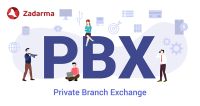Do you still believe that business phone systems are expensive and complicated? We’d like to change your mind and to show you an example of how you can make a good use of office phone solutions. As a result, you will be able to easily set up the cloud PBX and to spend only $5.50 per month, basically the price of a burger!
Free Cloud PBX
Cloud PBX (also called Virtual PBX) is an excellent alternative to the old school office phone system as the data is stored and transferred over the internet rather than on a computer or hardware. Clients benefit from a modern cloud technology and have everything they need for a quick and easy setup.

PBX Setup
Let’s take a small food delivery store as an example. The owner of the store, Peter Smith, has decided to set up the PBX himself. He registered on the website and bought a direct phone number in Chicago. He decided what telephone functions are required for his business and began the setup process. So here is what he needed: to create the extension numbers (for the customer service, the accounting department and for himself), to add a voice menu and a call scenario and to set up the incoming calls to be received during the working hours only.

In his personal profile, Peter switched on the PBX and went to the PBX Wizard.
- Creating extension numbers. Peter would need 4 extension numbers: 101 for the customer service, 102 for the accounting department, 103 for himself and 104 for the the voicemail during the non working hours.
- Voice menu/greeting. This can be autogenerated from text or uploaded as an audio file. Peter did not have much time, so he just entered the text of his greeting and the system automatically read it. “Hello, this is food delivery service. To contact our customer service, please press 1, to contact our accounting department, press 2 and to contact our management representative, press 3.”
- Incoming call scenario. By setting up the call scenario, Peter will manage which extension lines will receive calls first and in what order. For example, if he is unable to pick up a call within 15 seconds, the incoming call will be re-directed to his assistant.

Peter managed to successfully set up the PBX and it only took him 8 minutes! Additionally, Peter can also set up a Caller ID for his Chicago number, so when he calls someone, his phone number will be identified and shown to the person receiving his call. Since Peter bought only one number, his Chicago number will be automatically set as his Caller ID. In future, if Peter decided to buy more phone numbers, the Caller ID can be changed in the PBX settings.
Every department in the food delivery store receives phone calls to IP-phones, and Peter receives calls on his mobile, since he is often out of office and on business trips. If he is away and he has no internet access, the incoming calls will be redirected to his personal mobile number (conditional call forwarding can be set up in the My PBX - Extension Settings) and he will never lose a client call.
Des Moines Office
Peter’s business grew and became successful. He decided to expand and open an office in Des Moines. However, opening a real physical store was a little too expensive for him, so he decided to open a virtual office, an official branch of his company in another city. Peter bought a virtual phone number in Des Moines and now clients can call that number directly thinking that they are calling Peter’s new office in a different town. Alternatively, they can call the Chicago number and be redirected to the office in Des Moines.
Now Peter decides to do something else. He connects his Des Moines phone number and extends the previous call scenario. Now, in order to contact the manager dealing with clients in the new city, callers will have to press 5. Alternatively, clients can also see a Des Moines phone number on the website, which can be used to reach the manager directly.
Having two virtual offices allows Peter to set up two different voice menus to each phone number and to set up different working hours for each office. For example, Peter’s Chicago customer service works from 10am till 7pm, whereas the De Moines store works from 7am till 5pm.
Budget
Once Peter has set everything up, he no longers needs to spend time or too much money on his office phone system. He only pays $5.50 per month and focuses on what’s important to him, which is growing his business and delivering excellent service to his clients. If we look at his budget in detail, we can see what he is spending his money on. Monthly fees for two phone numbers in two cities cost $4.00 ($2.00 for the number in Chicago and $2.00 for the number in Des Moines) and the offices make outgoing calls worth around 250 minutes per month. Peter took advantage of Zadarma Standard price plan, where first 100 minutes are free and any additional minutes are charged at around 1 cent per minute, meaning he spends around $1.50 on his outgoing calls each month. So if we add $4 monthly fee to $1.50, we get $5.50, which Peter spends on his telephony each month.
With time Peter might even think about expanding his business internationally and he will still be able use budget friendly telephony solutions. Just like Peter, you also can take advantage of Cloud PBX and save up on costly phone bills, just register on Zadarma and try it yourself!
 Calls
Calls
 Phone numbers
Phone numbers
 eSIM for traveling
eSIM for traveling
 SMS
SMS
 Business Phone System
Business Phone System
 Speech analytics
Speech analytics
 Callback button
Callback button
 Video conferencing
Video conferencing
 Click to call button
Click to call button
 VoIP for Business
VoIP for Business
 Become a partner
Become a partner
 Integrations
Integrations
 For whom
For whom
 Setup guides
Setup guides
 FAQ
FAQ
 Online chat
Online chat
 Contact support
Contact support
 Blog
Blog













